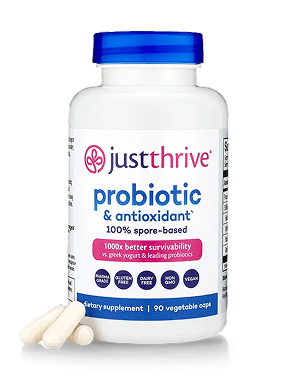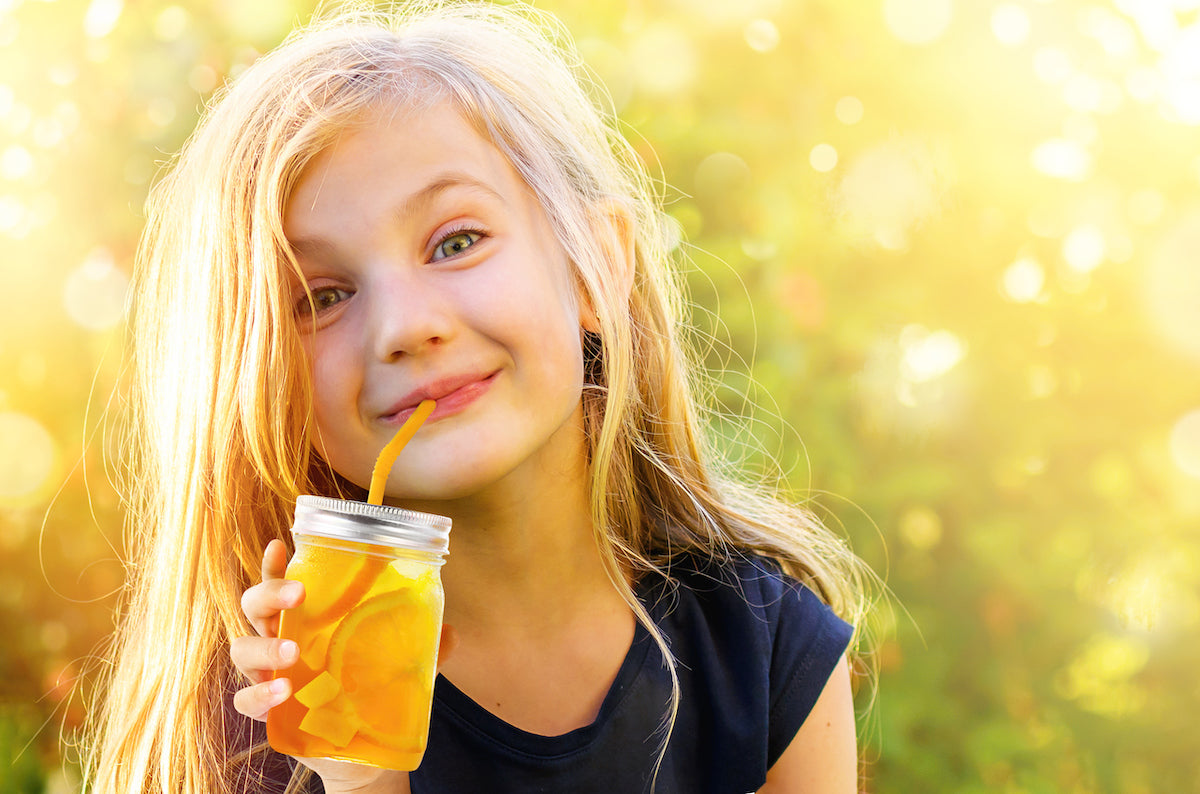All kids feel scared, worried, stressed, and sad sometimes.
Unfortunately, for millions of children those feelings don’t go away.[1]
Instead, they transform into lasting anxiety and depression. These are conditions that can interfere with children’s mental and physical health. They can interrupt learning, playing, and socializing—all of which are crucial for healthy development.
Luckily, parents have a safe, effective option to help ease those troubling challenges… but it’s not what you’d expect.
It turns out that the gut microbiome—the trillions of bacteria that live in the gut—has an enormous impact on mental health.[2] And the best way to manage anxiety and depression may start in the gut.
Depression and anxiety look different in kids
It can be tough to tell that your child is struggling with anxiety or depression. Signs differ widely depending on age, and many of them can seem more like physical or behavioral issues.
In children, anxiety can show up as:
- Trouble sleeping
- Fussy eating
- Anger
- Irritability
- Stomachaches
- Headaches
- Excessive crying
- Regressing to earlier behaviors (like bed-wetting or tantrums)
On top of that, children may experience panic attacks that come on suddenly and can cause trouble breathing, dizziness, shaking, and sweating.

Depression can also cause huge changes in your child’s behavior:
- Not wanting to do fun things or activities they normally love
- Eating a lot more or a lot less than usual
- Sleeping a lot more or a lot less than usual
- Feeling worthless, hopeless, guilty, or irritable
- Being unable to pay attention
- Hurting themselves
- Causing trouble
If you suspect your child may be anxious or depressed, contact their healthcare provider or a mental health professional.
You can also help your child by encouraging healthy choices, like:
- Eating a wide variety of healthy foods
- Exercising
- Spending time outdoors
- Practicing mindfulness
- Sticking to a routine (especially for younger children)
And one of the most important—and often overlooked—steps involves cultivating a healthy gut microbiome.

Calm minds and happy moods start in the gut
Believe it or not, your child’s emotional state gets its start in their gut.[3]
To feel calm and happy, your child’s gut microbiome has to be in healthy balance.[4] That means beneficial bacteria (probiotics) have to outnumber harmful bacteria (pathogens).
Beneficial gut bacteria produce important neurotransmitters (brain chemicals) like serotonin, dopamine, and GABA that help us feel good and relaxed.[5] Probiotic bacteria also reduce oxidative stress and help manage a healthy inflammatory response—both of which can play a role in anxiety and depression.
Unfortunately, it’s pretty easy to knock the gut microbiome out of balance. Common causes include:
- Antibiotics
- Sugar overload
- Pesticides (like glyphosate)
- Artificial sweeteners
- Stress
Any of those can bring on dysbiosis, a condition where bad bacteria outnumber good bacteria in the gut.[6] And dysbiosis can make it harder for your child to deal with stress, fear, and worry… and set them on the path toward anxiety and depression.
Related Blog
5 ways an unbalanced gut leads to depression and anxiety
Gut dysbiosis can trigger a series of events that leave your child feeling depressed and anxious. That’s because the gut and the brain have a direct connection called the gut-brain axis. In other words, what happens in the gut impacts the brain.
When your child’s gut is in a state of dysbiosis, harmful bacteria can:
- Crowd out the probiotic bacteria that normally produce feel-good brain chemicals like serotonin and GABA[7]
- Increase an unhealthy inflammatory response, which can lead to mood disorders[8]
- Produce harmful proteins (called peptides) that change signals in the brain—a state which has been linked to depression and anxiety[9]
- Disrupt the body’s stress management system so your child never has a chance to fully calm down[10]
- Produce LPS toxins (lipopolysaccharides) that escape into the bloodstream and send messages to the brain that negatively affect your child’s mood[11]
Every step in that cascade can lead to—or increase—emotional struggles for your child.[12] The best way to help support a balanced mood for your child is to get (and keep) their gut microbiome in healthy balance.
Support your best gut health. Try Just Thrive Probiotic today!
Just Thrive Probiotic (30/90)
The only probiotic guaranteed to arrive 100% alive




Just Thrive Keeps Your Kid’s Gut in Balance
Just Thrive Probiotic contains four clinically proven strains of spore probiotics – including strains that were tested extensively in children. These spore probiotics get to work quickly to recondition and maintain a healthy, well-balanced gut microbiome.
And in case you’re wondering how you’re going to get your kids to take probiotics—they don’t have to! At least, they don’t have to swallow any capsules.
One of the amazing powers of Just Thrive spore probiotics is that they’re temperature-resistant. That means spore probiotics can survive extreme heat and cold and still arrive in the gut 100% alive and ready to get to work.
You can mix Just Thrive Probiotic into any food your child will eat, from mac and cheese to smoothies. You can bake probiotics into cookies or brownies… add them to pasta sauce… or freeze them in fruit pops.
A single capsule’s worth of Just Thrive Probiotic every day can help keep your child’s gut bacteria in healthy balance for better physical, mental, and emotional health.
>> Balance your child’s gut microbiome with Just Thrive Probiotic today.
Plus, our same amazing formula also comes in delicious gummies! They're non-GMO, and contain no artificial sweeteners or colors, gluten, soy, dairy, salt, nuts, or histamines.
Not quite sure Just Thrive Probiotic is right for you? We've got you covered!
We’re confident that when you take our probiotic as directed, you’ll notice a positive difference.
But if you aren’t completely happy, let us know.
Every Just Thrive purchase comes with our Bottom of the Bottle, 100% money-back guarantee. If you’re not satisfied with your purchase for any reason, you can request a full product refund at any time. Even if it’s been 3 days… 3 weeks… or 3 months. Even if the bottle is empty!
Sources
- Centers for Disease Control and Prevention. About children's mental health. Published June 9, 2025. Accessed August 8, 2025. https://www.cdc.gov/children-mental-health/about/index.html
- Van Ameringen M, Turna J, Patterson B, et al. The gut microbiome in psychiatry: A primer for clinicians. Depress Anxiety. 2019;36(11):1004-1025. doi:10.1002/da.22936
- Huang TT, Lai JB, Du YL, Xu Y, Ruan LM, Hu SH. Current Understanding of Gut Microbiota in Mood Disorders: An Update of Human Studies. Front Genet. 2019;10:98. Published 2019 Feb 19. doi:10.3389/fgene.2019.00098
- Science Daily. Anxiety might be alleviated by regulating gut bacteria. Published May 21, 2019. Accessed August 8, 2025. https://www.sciencedaily.com/releases/2019/05/190520190110.htm
- González-Arancibia C, Urrutia-Piñones J, Illanes-González J, et al. Do your gut microbes affect your brain dopamine?. Psychopharmacology (Berl). 2019;236(5):1611-1622. doi:10.1007/s00213-019-05265-5
- Schnorr SL, Bachner HA. Integrative Therapies in Anxiety Treatment with Special Emphasis on the Gut Microbiome. Yale J Biol Med. 2016;89(3):397-422. Published 2016 Sep 30.
- Evrensel A, Ceylan ME. The Gut-Brain Axis: The Missing Link in Depression. Clin Psychopharmacol Neurosci. 2015;13(3):239-244. doi:10.9758/cpn.2015.13.3.239
- Salim S, Chugh G, Asghar M. Inflammation in anxiety. Adv Protein Chem Struct Biol. 2012;88:1-25. doi:10.1016/B978-0-12-398314-5.00001-5
- Lach G, Schellekens H, Dinan TG, Cryan JF. Anxiety, Depression, and the Microbiome: A Role for Gut Peptides. Neurotherapeutics. 2018;15(1):36-59. doi:10.1007/s13311-017-0585-0
- Foster JA, Rinaman L, Cryan JF. Stress & the gut-brain axis: Regulation by the microbiome. Neurobiol Stress. 2017;7:124-136. Published 2017 Mar 19. doi:10.1016/j.ynstr.2017.03.001
- Grigoleit JS, Kullmann JS, Wolf OT, et al. Dose-dependent effects of endotoxin on neurobehavioral functions in humans. PLoS One. 2011;6(12):e28330. doi:10.1371/journal.pone.0028330
- Bruce-Keller AJ, Salbaum JM, Berthoud HR. Harnessing Gut Microbes for Mental Health: Getting From Here to There. Biol Psychiatry. 2018;83(3):214-223. doi:10.1016/j.biopsych.2017.08.014











